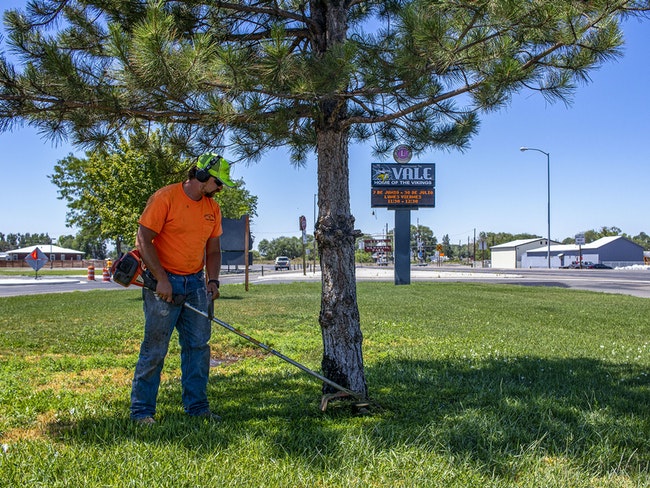
Vale city worker Eric Goodell trims the grass around the trees at Lewin City Park on a hot June afternoon. (AUSTIN JOHNSON/The Enterprise)
When the conditions are as extreme as those in the forecast for Malheur County, the body can quickly become dehydrated, losing its natural ability to cool down and setting up potential heat illnesses, according to medical authorities.
“Heat related illness is something that we deal with on a regular basis throughout the summer,” said Dr. Daniel Bridger, urgent care medical director for Saint Alphonsus Hospital in Ontario. “With the temperatures over the next few weeks, we will be very cognizant of that and ready for any increase in patient volume that we may see related to heat related illnesses.”
In the United States, an average of 700 people a year died from heat-related conditions from 2004 to 2018, according to the Centers of Disease Control and Prevention.
“World Health Organization has a pretty large category of heat disorders, 10 of them specifically,” according to Dr. Martha Taylor, a St. Luke’s health system medical director for urgent care. “The most common found in those who go outside, and especially those who are engaged in more vigorous activities, are heat cramps, heat syncope, heat exhaustion and heat stroke.”
Heat cramps are muscle cramps or spasms usually in the legs and the abdomen along with heavy sweating. Sweating diminishes the body’s salt and moisture levels, and this low level of sodium and fluids is what causes muscles to cramp up, according to the CDC.
Next in severity comes heat syncope, which is a fainting episode or dizziness that commonly occurs when person is standing for a prolonged period or from standing up too fast from a sitting or lying position.
Then there is heat exhaustion and heat stroke. Heat exhaustion is much more common and milder in severity than heat stroke but should be taken seriously if symptoms start to develop.
“Heat exhaustion is kind of an overload in the system,” said Dr. Sean Robinson, assistant professor of family medicine at Oregon Health and Science University. “If you’re working and exercising, your body’s making heat, and then the outside temperature is making heat causing your body to heat up fast.”
This is when the body enacts its natural cooling mechanisms, like sweating or heavy breathing, and the brain starts telling the body to slow down or even to stop, according to the Robinson.
The CDC’s list of heat exhaustion symptoms include headache, dizziness, elevated body temperature, heavy wetting, nausea, feeling physical weak or irritable and decreased urine output.
A person experiencing any of these symptoms needs to take immediate action. The National Weather Service advises any person suffering from heat exhaustion to seek a cool environment, preferably air conditioned space, and take small but frequent sips of water.
Those in distress should remove surface clothing or loosen clothing and apply cool, wet cloths to the skin or submerge in a body of water.
“There may not always be precursors to heat exhaustion or heat stroke,” Bridger said. “And that’s one of the more concerning things about heat-related illnesses. You can go quite quickly from feeling pretty well to really not feeling well.”
If symptoms of heat exhaustion last more then an hour, a person needs to seek immediate medical attention.
Heat stroke shares some of the same symptoms of heat exhaustion but can be fatal. According to the CDC medical attention is needed immediately for anyone experiencing confusion, distorted mental state or slurred speech, extremely high body temperature, profuse sweating followed by dry skin, seizures or a loss of consciousness.
“Thankfully, most humans pay attention to their check engine light, so we don’t typically see heat stroke all that often,” Robinson said. “Heat exhaustion is what we typically see and we’re definitely going to see it this week with these high temperatures.”
But some populations, like children, aren’t always paying attention to their conditions, making them more vulnerable to heat illnesses, Robinson said.
“Children’s bodies are very well able to compensate physiologically to mask a lot of the more serious signs and symptoms until it’s too late,” Taylor said. “They will go from zero to 60 – from looking okay to looking very bad very quickly.”
Other populations that are vulnerable to heat related illnesses are pregnant woman, people with conditions such a high blood pressure or cardiovascular aliments and the elderly.
According to Taylor, elderly people are especially at risk because they tend to have more health conditions and age decreases their natural ability to regulate blood pressure or heart rate.
Medical authorities also said people should avoid drinking too many diuretics like alcoholic or caffeinated drinks because they can increase the rate of dehydration due to increased urination. Kicking back with an ice-cold beer or an iced coffee can hit the spot on a hot day, but these types of drinks are best followed with an equal amount of water during a heat wave.
The bottom line to staying healthy during a heat wave is preparation.
The advice is universal:
*Check in frequently with children and the elderly to make sure they’re doing okay.
*Drink plenty of water and wear sunscreen or UV protective clothing.
*Plan your day so that if you do have to be outside it isn’t during those peak temperature hours.
“Strategically planning our days is very important,” Bridger said. “It’s important that we plan our days and make sure we’re doing things in the early mornings, or the late evenings when our exposure risks are lowest.”
News tip? Contact multimedia journalist Austin Johnson: [email protected] or (541) 784-7151.
RELATED COVERAGE:
HEAT WAVE: Outdoor workers in Malheur County adjust to dangerous heat
HEAT WAVE FORECAST: Lower temps expected this week than previously predicted but still extremely hot
PHOTOS: From pools to parks, Malheur County turns to water for relief
HEAT WAVE: Where to beat the heat with a dip in the water
HEAT WAVE: Nyssa vet advises keeping those pet paws off the pavement
For the latest news, follow the Enterprise on Facebook and Twitter.
SUBSCRIBE TO HELP PRODUCE VITAL REPORTING — For $5 a month, you get breaking news alerts, emailed newsletters and around-the-clock access to our stories. We depend on subscribers to pay for in-depth, accurate news produced by a professional and highly trained staff. Help us grow and get better with your subscription. Sign up HERE.




